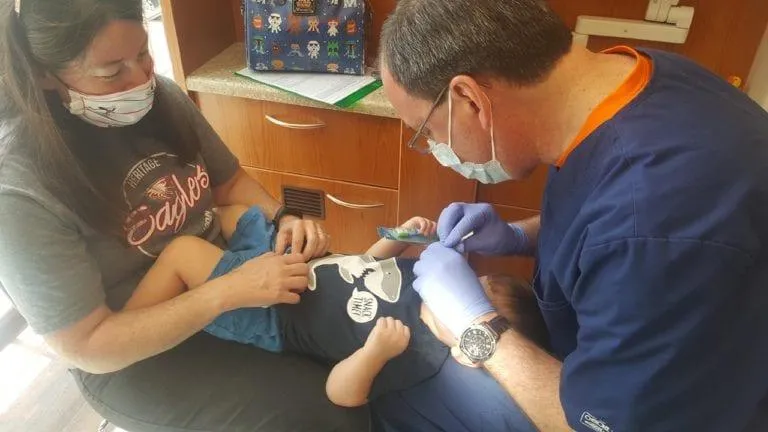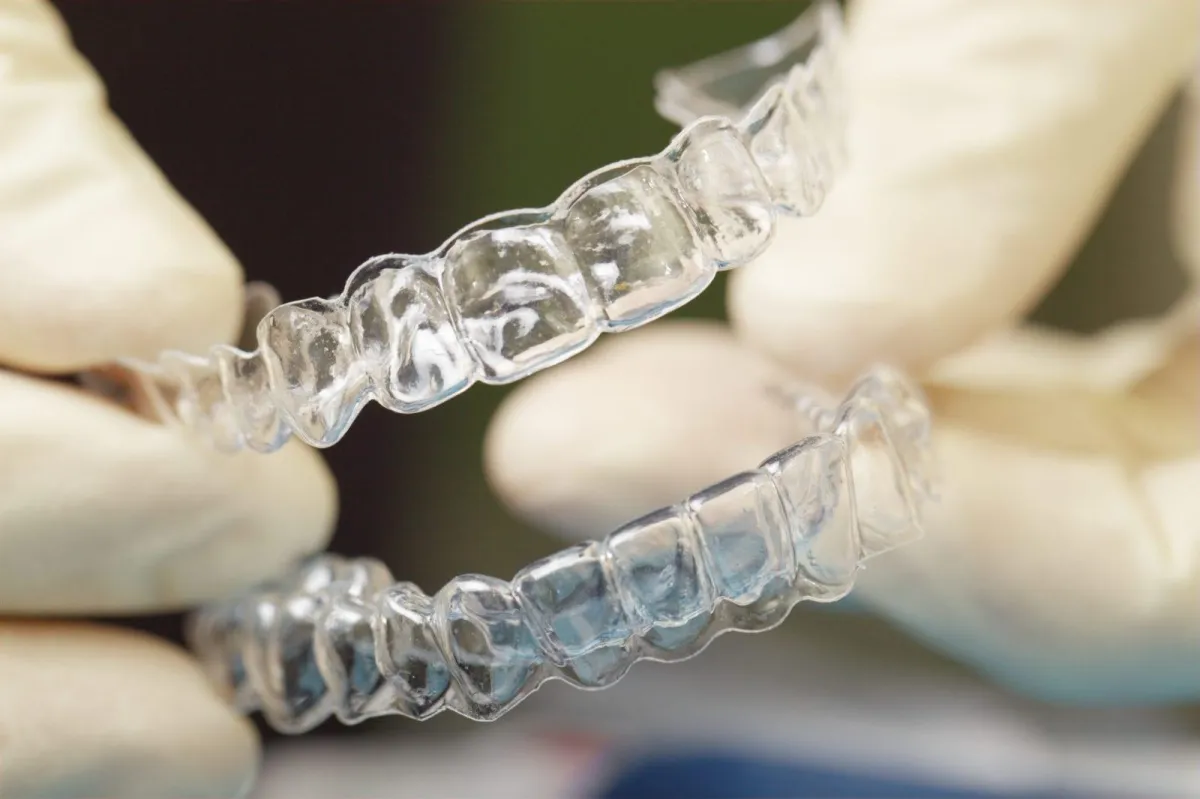WELCOME TO
HURST PEDIATRIC DENTISTRY!
Here at the pediatric dental office of Dr. Joby Hurst, we take pride in offering our young patients the highest quality of dental care in a kid-friendly environment. We are conveniently located in Birmingham, Alabama and are experienced in providing routine dental care for infants, children, teens and patients with special needs.
Dr. Hurst and his team of friendly professionals work together to provide a positive dental experience that will make your child smile! We promise to work with you and your child personally and create a customized treatment plan to meet your individual needs and desires.
Office tour
Early Dental Care
We believe early dental care can promote a lifetime of healthy smiles for your child. We offer a full range of services from routine dental exams and cleanings to fillings, sealants and fluoride treatments that will help ensure that your child grows up with a healthy smile.
Sedation Dentistry
We recognize that for some of our patients, a visit to the dentist makes them a bit nervous.
We offer nitrous oxide sedation for our more apprehensive patients, so they can relax while receiving the dental care that they need.
For those requiring more intensive treatment, Dr. Hurst offers in office anesthesia using Dr. Jeff Plagenhoef.
Dr. Jeff is a board-certified pediatric anesthesiologist with Pediatric Dental Anesthesia Associates.
We appreciate your interest in our practice and encourage you to continue exploring our website to learn more about us. Feel free to contact us to schedule an appointment with Dr. Joby Hurst today!

Blogs and Resources

How to Stop Teeth Grinding in Children
Understanding Teeth Grinding in Children
Have you ever noticed your child grinding or clenching their teeth during the day or night? This seemingly small behavior is more common than many parents realize and can be a source of concern. Bruxism, the medical term for teeth grinding, is a condition that affects people of all ages, but it seems to be particularly prevalent among children. According to research from Kids Health, approximately three out of ten children engage in this behavior, either grinding or clenching their teeth.
At first glance, bruxism might not appear to be a serious issue—after all, many children grow out of it as they age, particularly as they begin to lose their baby teeth. But for those in the thick of it, bruxism can be more than just a quirky habit. The repetitive grinding can lead to a range of issues, from headaches and jaw pain to disrupted sleep patterns and even wear on the teeth. For some children, this condition persists into adolescence and, in rarer cases, adulthood, where it can continue to impact their oral health and overall well-being.
As a parent, it's natural to wonder what causes this behavior and what, if anything, should be done about it. Is your child stressed? Are there underlying health issues? Or is it simply a phase that will pass with time? While bruxism is often self-limiting, understanding the triggers and potential consequences can help you make informed decisions about your child’s health. By addressing the issue early on, you can potentially mitigate the discomfort and prevent any long-term damage, ensuring that your child can sleep peacefully and grow healthily without the burden of this condition.
Signs That Your Child May Be Grinding Their Teeth
Identifying teeth grinding in children isn’t always straightforward, as it often occurs during sleep. However, there are some signs you can look for:
Audible Grinding: You may hear a clicking or grinding noise when your child is asleep.
Complaints of Jaw or Face Pain: Grinding can cause discomfort in the jaw or face, especially in the morning.
Worn or Sensitive Teeth: Teeth that appear flat or show signs of wear may indicate grinding.
Frequent Headaches: Grinding can sometimes cause headaches, especially after waking.
Disturbed Sleep: If your child’s sleep seems unusually restless, teeth grinding could be a factor.
If you suspect your child is grinding their teeth, try gently asking them if they feel any discomfort in their mouth or jaw, or if they feel more tired than usual.
At Hurst Pediatric Dentistry, we check to see if children are grinding their teeth by checking for chipped teeth, worn enamel, and teeth sensitivity. We also spray air or water on the teeth to check to see just how sensitive the teeth are.
We also ask your child specific questions to determine their level of stress as well as questions about their bedtime routines. From the examination and the answers to the questions, we determine what type of grinding your child is having.
Types of Teeth Grinding
Bruxism, or teeth grinding, is a common condition characterized by the involuntary clenching or grinding of teeth. It can occur during both wakefulness and sleep, with distinct characteristics and potential causes for each type.
There are two types of bruxism (teeth grinding): awake and sleep.
Awake Bruxism (Diurnal Bruxism)
Awake bruxism is the term used to describe teeth grinding or jaw clenching that occurs while a person is conscious. Unlike sleep bruxism, it's often a more conscious behavior, although individuals may not be fully aware of it.

Characteristics of Awake Bruxism
Clenching: This is the most common form of awake bruxism, where the jaw muscles are tightly contracted.
Grinding: Less frequent than clenching, grinding involves moving the upper and lower teeth together in a harsh, abrasive manner.
Daytime occurrence: As the name implies, it happens during waking hours.
Often associated with stress: Many people clench or grind their teeth when feeling anxious, frustrated, or overwhelmed.
Less severe tooth damage: Compared to sleep bruxism, the damage to teeth is typically less pronounced.
Potential Causes of Awake Bruxism
Stress and anxiety: Emotional factors are primary triggers for awake bruxism.
Personality traits: Individuals with Type A personalities or those who are highly competitive may be more prone to clenching or grinding.
Habit: Some people develop a habit of clenching or grinding their teeth, even when not stressed.
Certain medications: Some drugs can contribute to jaw muscle tension and bruxism.
Symptoms of Awake Bruxism
Jaw pain and tenderness: This is the most common symptom.
Facial pain: Pain in the temples or cheeks.
Headaches: Tension-type headaches can be associated with jaw clenching.
Earaches: In some cases, ear pain may occur.
Muscle fatigue: Tiredness and soreness in the jaw muscles.
Difficulty opening the mouth: In severe cases, jaw stiffness may limit mouth opening.
Treatment for Awake Bruxism
Stress management: Techniques like meditation, yoga, or deep breathing can help reduce stress and jaw clenching.
Relaxation exercises: Targeted exercises for the jaw muscles can help relieve tension.
Biofeedback: This technique can help individuals become aware of jaw muscle tension and learn to relax them.
Dental appliances: In severe cases, a bite guard or splint may be recommended to protect teeth.
Medications: Muscle relaxants or pain relievers may be prescribed for short-term relief.
It's important to note that while awake bruxism can be uncomfortable and cause some dental damage, it's often less severe than sleep bruxism. Addressing underlying stress and practicing relaxation techniques are often effective in managing the condition.

Sleep Bruxism (Nocturnal Bruxism)
Sleep bruxism is characterized by rhythmic grinding of the teeth during sleep. It's classified as a sleep-related movement disorder, often associated with other sleep disturbances like sleep apnea or restless leg syndrome. This type of bruxism can cause significant damage to teeth, including:
Tooth wear: Grinding can gradually erode tooth enamel, leading to flattened or chipped teeth.
Jaw pain: The constant muscle tension can result in pain and stiffness in the jaw joint.
Headaches: Tension in the jaw muscles can contribute to headaches.
Earaches: In some cases, bruxism can cause ear pain.
Factors Contributing to Bruxism
While the exact causes of bruxism are not fully understood, several factors may contribute to its development:
Stress and anxiety: Emotional factors are often linked to both awake and sleep bruxism.
Malocclusion: Improper bite alignment can increase the likelihood of grinding.
Medications: Certain medications may have side effects that contribute to bruxism.
Sleep disorders: Conditions like sleep apnea or restless leg syndrome can be associated with sleep bruxism.
Genetics: There may be a genetic predisposition to bruxism.
Treatment Options
Treatment for bruxism aims to alleviate symptoms, protect teeth, and address underlying causes. Common treatment options include:
Mouthguards: Custom-made mouthguards can protect teeth from the damage caused by grinding.
Stress management techniques: Relaxation techniques like meditation, yoga, or deep breathing can help reduce stress.
Medications: In some cases, muscle relaxants or medications for sleep disorders may be prescribed.
Dental adjustments: If misalignment is a contributing factor, dental procedures may be recommended.
Botox injections: In severe cases, Botox injections can temporarily relax the jaw muscles.
It's important to consult with a dentist or healthcare provider to determine the underlying cause of bruxism and develop an appropriate treatment plan.
What Causes Teeth Grinding?
Although the exact cause of teeth grinding is unknown, scientists think it may be a combination of physical, genetic, and psychological issues.
Bruxism can be caused by a variety of things, such as stress, anxiety, and a variety of sleep disorders. When a child has stress or anxiety, grinding can be a coping mechanism to diffuse it. If a child has a sleep disorder, such as sleep apnea, bruxism will likely accompany it.
Stress in children can be related to many factors including worrying about grades, taking tests, coping with a new teacher, or dealing with peer pressure in school. At home, kids can be affected by arguments with siblings and parents or by the introduction of a new family member, like a baby brother or sister.
Another cause of teeth grinding in children is incoming teeth. Your child may clench and grind their teeth to relieve aches and pains caused by the adult teeth pressing on the baby teeth.
According to Delta Dental, other causes can include reactions to medications, teeth misalignment, growing pains, and injuries. Pains from earaches tend to cause teeth grinding as well.
The personality your child has can affect whether they develop teeth grinding. Kids that are aggressive, hyperactive, or competitive are at increased risk for experiencing bruxism.
In addition, the Mayo Clinic states that certain disorders can increase the risk of developing teeth grinding such as GERD (gastroesophageal reflux disorder), ADHD (attention-deficit/hyperactivity disorder), sleep apnea, epilepsy, and night terrors.

Effects of Teeth Grinding
A child grinding their teeth can lead to many serious issues that will affect them later on in life.
One major issue that can arise is temporomandibular joint disorder (TMD). This joint is responsible for connecting the lower jaw to the base of the skull. It allows for talking, chewing, and yawning. With TMD, the joint is worn down from overuse and can allow the bone to slip out of its socket. This may or may not be painful, but can cause problems later in life.
Not only does teeth grinding put your child at risk for developing TMD, but it can also physically damage your child’s teeth. Teeth grinding can wear down the enamel of teeth or cause chipping.
It can also increase tooth sensitivity and cause serious jaw, neck, and facial pain, including damage to the inside of the cheek. Teeth grinding can also cause headaches and earaches. While most cases are not this severe, it is something you should ask your dentist about at checkup time.
Preventing and Treating Teeth Grinding at Home
Once you’ve identified teeth grinding, there are several steps you can take at home to help reduce its impact and prevent it from worsening.
1. Create a Relaxing Bedtime Routine
Since stress is a significant factor in teeth grinding, creating a calming bedtime routine can be incredibly helpful. Consider these steps:
Limit screen time an hour before bed, as screens can interfere with sleep quality.
Encourage calming activities like reading a story, deep breathing exercises, or listening to soft music.
Introduce bedtime stretches or light massage to relax the jaw and facial muscles.
2. Monitor Their Diet
Nutrition plays a role in muscle health and stress management. Try to include a balanced diet rich in:
Magnesium and Calcium: These minerals are known to support muscle relaxation. Foods like leafy greens, nuts, seeds, and dairy products are good sources.
Avoid Caffeine: While caffeine is rare in children’s diets, it’s still found in some sodas, chocolate, and certain snacks. Caffeine can exacerbate grinding by causing muscle tension and interfering with sleep.
3. Encourage Regular Exercise
Physical activity is a natural way to relieve stress, making it a good option for children who may be grinding due to anxiety. A regular exercise routine can help your child release pent-up energy, relax, and feel more at ease.
4. Teach Jaw Relaxation Techniques
Children can benefit from learning simple relaxation techniques for their jaw. Encourage your child to:
Open their mouth wide and gently stretch their jaw before bed.
Practice breathing exercises to relax the body and reduce tension.
Place a warm cloth on their jaw for a few minutes before sleep to ease muscle tension.
5. Use a Mouth Guard if Necessary
If your child’s bruxism is severe, a dentist may recommend a custom-fitted mouth guard to protect their teeth. Mouth guards can help prevent wear and tear on the teeth, as well as ease any jaw discomfort.
When to Seek Professional Help
If home interventions aren’t enough, or if you notice that your child’s teeth grinding is causing pain or dental damage, it may be time to consult with a pediatric dentist. Here’s what you can expect during the consultation:
Assessment of Dental Health: The dentist will examine your child’s teeth to look for signs of wear, alignment issues, or other potential causes of bruxism.
Discussing Potential Treatments: Depending on the severity, the dentist might suggest a custom mouth guard, physical therapy for jaw relaxation, or even addressing underlying stress or anxiety.
Follow-up Visits: Regular follow-ups allow the dentist to monitor your child’s condition and make adjustments as needed.
Don’t hesitate to reach out to a dental professional. Early intervention can make a significant difference in managing bruxism and preventing long-term dental problems.
The Role of Good Dental Hygiene in Reducing the Impact of Teeth Grinding
Maintaining a solid dental hygiene routine is crucial for children who grind their teeth, as it helps keep their teeth and gums healthy, minimizing potential issues caused by grinding.
Tips for Good Dental Hygiene:
Brush Twice a Day: Encourage your child to brush their teeth in the morning and before bed.
Floss Regularly: Daily flossing removes plaque between teeth that a toothbrush may miss.
Use Fluoride Toothpaste: Fluoride helps strengthen enamel, protecting it from the wear that grinding can cause.
Visit the Dentist Regularly: Routine dental check-ups are essential to keep track of any changes in dental health, particularly if your child has been grinding their teeth.
Addressing Stress and Anxiety Related to Teeth Grinding
Teeth grinding in children is often a response to stress, so helping your child manage anxiety can go a long way in reducing bruxism. Here are some strategies to consider:
Open Communication: Talk with your child about any worries they may have, offering support and reassurance.
Create a Safe Space: Give your child a dedicated time to share their concerns, which can relieve stress.
Mindfulness and Relaxation Practices: Simple techniques, like guided breathing, gentle yoga, or even progressive muscle relaxation, can be helpful in easing tension that contributes to grinding.
The Connection Between Sleep Quality and Teeth Grinding
Poor sleep can worsen teeth grinding, so it’s crucial to prioritize your child’s sleep quality. Along with a relaxing bedtime routine, ensure they have a comfortable mattress, a dark and quiet bedroom, and a consistent sleep schedule.
If you suspect sleep disorders like sleep apnea are causing the grinding, talk to your pediatrician, who may recommend a sleep study to assess your child’s sleep quality and identify any underlying issues.
Your child’s dental health is too important to be affected by pediatric bruxism. If you notice any of the above symptoms, Hurst Pediatric Dentistry will be there to help. If you want to learn more or make an appointment, contact us or call (205) 969-7454.

19 INVERNESS CENTER PARKWAY, STE 250, BIRMINGHAM, AL 35242
TEL: 205.969.7454
E-MAIL: [email protected]
2018 © ALL RIGHTS RESERVED | PRIVACY POLICY | TERMS AND CONDITIONS
Site by Trustway Marketing Powered by Kyrios Systems